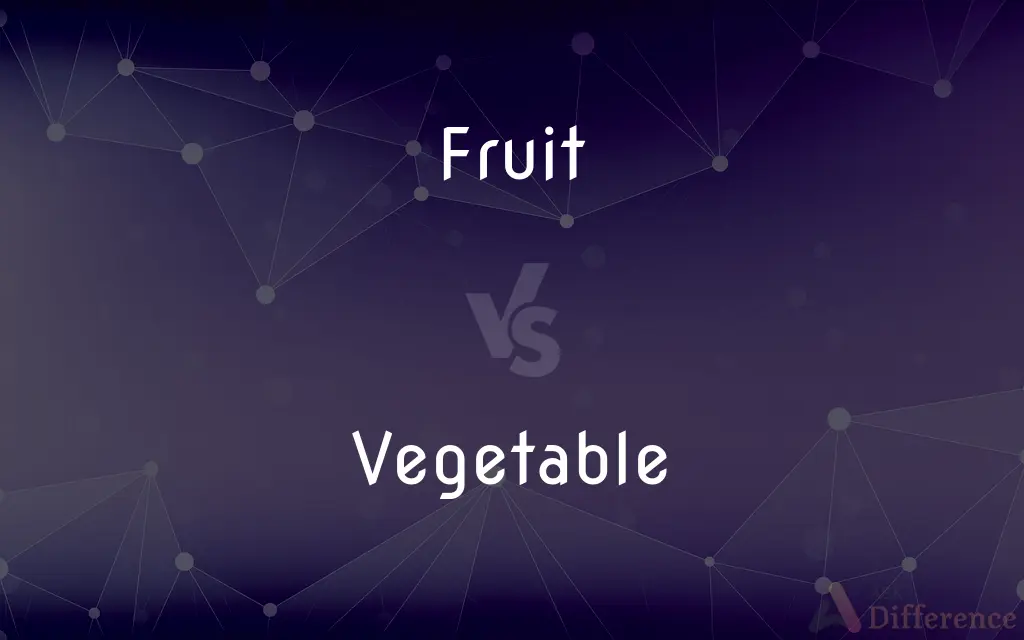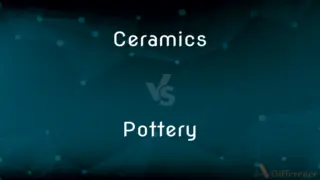Fruit vs. Vegetable — What's the Difference?
By Tayyaba Rehman — Updated on September 23, 2023
Fruit is the mature ovary of a flowering plant, usually sweet or tart, and often consumed as a natural snack. A vegetable is any edible part of a plant that does not contain the seeds, like leaves, stems, and roots, and is generally savory.

Difference Between Fruit and Vegetable
Table of Contents
ADVERTISEMENT
Key Differences
A fruit is the mature ovary of a flowering plant, often containing seeds. It is usually sweet or tart in flavor and is typically consumed raw. A vegetable, by contrast, is an edible part of a plant that is not a fruit; this can include leaves, stems, and roots. Vegetables are generally savory and often consumed cooked, although they can be eaten raw as well.
In culinary terms, fruits are often considered to be sweet and are used in desserts or eaten raw as snacks. Vegetables are typically savory and are often cooked in savory dishes, though raw vegetables are common in salads and as crudités. However, some foods like tomatoes and avocados are fruits by botanical definition but are commonly treated as vegetables in culinary contexts.
The term "fruit" often implies that it is a part of the plant meant for dispersal, usually by animals that consume the fruit and later excrete the seeds. Vegetables do not serve this reproductive role in the plant's life cycle; they are parts of the plant that store energy, provide structure, or perform other functions but are not involved in seed dispersal.
Fruits and vegetables both offer a range of health benefits and are essential components of a balanced diet. Fruits generally provide more natural sugars and vitamins, particularly Vitamin C. Vegetables offer a wide range of nutrients, including essential minerals and fiber.
Comparison Chart
Botanical Definition
Mature ovary of a flowering plant
Edible part of plant excluding fruit
ADVERTISEMENT
Taste
Generally sweet or tart
Generally savory
Culinary Use
Desserts, raw snacks
Savory dishes, salads
Role in Plant
Seed dispersal
Storage, structure, etc.
Nutritional Content
High in natural sugars and vitamins
High in minerals and fiber
Compare with Definitions
Fruit
Fruits are commonly eaten raw.
Bananas are a fruit commonly consumed raw.
Vegetable
Vegetables are generally savory in taste.
Onions are a vegetable known for their strong, savory flavor.
Fruit
Fruits are often high in natural sugars and vitamins.
Oranges are a fruit rich in natural sugars and Vitamin C.
Vegetable
Vegetables are often rich in minerals and fiber.
Spinach is a vegetable high in iron and fiber.
Fruit
In botany, a fruit is the seed-bearing structure in flowering plants that is formed from the ovary after flowering. Fruits are the means by which flowering plants (also known as angiosperms) disseminate their seeds.
Vegetable
Vegetables are commonly cooked but can be eaten raw.
Broccoli is a vegetable often cooked but can be eaten raw in salads.
Fruit
The ripened ovary or ovaries of a seed-bearing plant, together with accessory parts, containing the seeds and occurring in a wide variety of forms.
Vegetable
Vegetables often do not contain seeds.
Carrots are a root vegetable that does not contain seeds.
Fruit
An edible, usually sweet and fleshy form of such a structure.
Vegetable
Vegetables are parts of plants that are consumed by humans or other animals as food. The original meaning is still commonly used and is applied to plants collectively to refer to all edible plant matter, including the flowers, fruits, stems, leaves, roots, and seeds.
Fruit
A part or an amount of such a plant product, served as food
Fruit for dessert.
Vegetable
A plant cultivated for its edible parts, such as the roots of the beet, the leaves of spinach, the flower buds of broccoli, or the fruit or seeds of certain species, as beans, corn, and squash.
Fruit
The fertile, often spore-bearing structure of a plant that does not bear seeds.
Vegetable
The edible part of such a plant.
Fruit
A plant crop or product
The fruits of the earth.
Vegetable
A member of the vegetable kingdom, especially a green plant.
Fruit
Result; outcome
The fruit of their labor.
Vegetable
Offensive Slang One who is severely impaired mentally and physically, as by brain injury or disease.
Fruit
Offspring; progeny.
Vegetable
Of, relating to, or derived from plants or a plant
Vegetable dyes.
Fruit
A fruity aroma or flavor in a wine.
Vegetable
Made from or with edible plants or plant parts
Vegetable lasagna.
Fruit
Offensive Slang Used as a disparaging term for a gay man.
Vegetable
Growing or reproducing like a plant.
Fruit
To produce or cause to produce fruit.
Vegetable
Any plant.
Fruit
In general, a product of plant growth useful to man or animals.
Vegetable
A plant raised for some edible part of it, such as the leaves, roots, fruit or flowers, but excluding any plant considered to be a fruit, grain, herb, or spice in the culinary sense.
Fruit
Specifically, a sweet and/or sour, edible part of a plant that resembles seed-bearing fruit see next sense, even if it does not develop from a floral ovary; also used in a technically imprecise sense for some sweet or sweetish petioles of rhubarb, that resemble a true fruit or are used in cookery as if they were a fruit.}}
Vegetable
The edible part of such a plant.
Fruit
(botany) A product of fertilization in a plant, specifically:
Vegetable
A person whose brain (or, infrequently, body) has been damaged so that they cannot interact with the surrounding environment; a person in a persistent vegetative state.
Fruit
The seed-bearing part of a plant, often edible, colourful and fragrant, produced from a floral ovary after fertilization.
Vegetable
Of or relating to plants.
Fruit
The spores of cryptogams and their accessory organs.
Vegetable
Of or relating to vegetables.
Fruit
An end result, effect, or consequence; advantageous or disadvantageous result.
His long nights in the office eventually bore fruit when his business boomed and he was given a raise.
Vegetable
Of or pertaining to plants; having the nature of, or produced by, plants; as, a vegetable nature; vegetable growths, juices, etc.
Blooming ambrosial fruitOf vegetable gold.
Fruit
(attributive) Of, belonging to, related to, or having fruit or its characteristics; of living things producing or consuming fruit.
Fresh-squeezed fruit juice
A fruit salad
An artificial fruit flavor
A fruit tree
Vegetable
Consisting of, or comprising, plants; as, the vegetable kingdom.
Fruit
A homosexual man; an effeminate man.
Vegetable
Plants having distinct flowers and true seeds.
Fruit
(archaic) Offspring from a sexual union.
The litter was the fruit of the union between our whippet and their terrier.
Vegetable
A plant. See Plant.
Fruit
(informal) A crazy person.
Vegetable
A plant used or cultivated for food for man or domestic animals, as the cabbage, turnip, potato, bean, dandelion, etc.; also, the edible part of such a plant, as prepared for market or the table.
Fruit
To produce fruit, seeds, or spores.
Vegetable
A person who has permanently lost consciousness, due to damage to the brain, but remains alive; sometimes continued life requires support by machinery such as breathing tubes. Such a person is said to be in a vegetative state.
Fruit
Whatever is produced for the nourishment or enjoyment of man or animals by the processes of vegetable growth, as corn, grass, cotton, flax, etc.; - commonly used in the plural.
Six years thou shalt sow thy land, and shalt gather in thefruits thereof.
Vegetable
Edible seeds or roots or stems or leaves or bulbs or tubers or nonsweet fruits of any of numerous herbaceous plant
Fruit
The pulpy, edible seed vessels of certain plants, especially those grown on branches above ground, as apples, oranges, grapes, melons, berries, etc. See 3.
Vegetable
Any of various herbaceous plants cultivated for an edible part such as the fruit or the root of the beet or the leaf of spinach or the seeds of bean plants or the flower buds of broccoli or cauliflower
Fruit
The ripened ovary of a flowering plant, with its contents and whatever parts are consolidated with it.
Vegetable
Of the nature of or characteristic of or derived from plants;
Decaying vegetable matter
A mineral deposit
Mineral water
Fruit
The spore cases or conceptacles of flowerless plants, as of ferns, mosses, algae, etc., with the spores contained in them.
Vegetable
A vegetable is any edible part of a plant that is not a fruit, such as leaves, stems, or roots.
Lettuce is a vegetable consisting of leaves.
Fruit
The produce of animals; offspring; young; as, the fruit of the womb, of the loins, of the body.
King Edward's fruit, true heir to the English crown.
Fruit
That which is produced; the effect or consequence of any action; advantageous or desirable product or result; disadvantageous or evil consequence or effect; as, the fruits of labor, of self-denial, of intemperance.
The fruit of rashness.
What I obtained was the fruit of no bargain.
They shall eat the fruit of their doings.
The fruits of this education became visible.
Fruit
To bear fruit.
Fruit
The ripened reproductive body of a seed plant
Fruit
The consequence of some effort or action;
He lived long enough to see the fruit of his policies
Fruit
An amount of a product
Fruit
Cause to bear fruit
Fruit
Bear fruit;
The trees fruited early this year
Fruit
A fruit is the mature ovary of a flowering plant often containing seeds.
An apple is a fruit that contains seeds in its core.
Fruit
Fruits are typically sweet or tart in flavor.
Lemons are fruits known for their tart flavor.
Fruit
Fruits often serve a role in seed dispersal.
Birds eat berries, which helps in the seed dispersal of fruiting plants.
Common Curiosities
What is a Vegetable?
A vegetable is an edible part of a plant that is not a fruit, such as leaves, stems, or roots.
What's the main taste difference between Fruits and Vegetables?
Fruits are generally sweet or tart, while vegetables are usually savory.
What is a Fruit?
A fruit is the mature ovary of a flowering plant often containing seeds.
Is a Tomato a Fruit or a Vegetable?
Botanically, a tomato is a fruit, but it is commonly treated as a vegetable in culinary contexts.
What role do Fruits serve in a plant's life cycle?
Fruits often serve a role in seed dispersal for the plant.
Can Vegetables be sweet?
Some vegetables, like sweet potatoes, have a sweeter taste but are still considered vegetables.
Do Fruits contain seeds?
Many fruits contain seeds, although some cultivated varieties may be seedless.
Are Vegetables always cooked?
No, many vegetables are eaten raw in salads or as crudités.
Are Fruits always sweet?
No, some fruits like avocados are not sweet but are still considered fruits botanically.
Are Fruits typically eaten raw?
Yes, fruits are commonly consumed raw, although some can be cooked.
What nutritional benefits do Fruits offer?
Fruits are often high in natural sugars, vitamins, and antioxidants.
What role do Vegetables serve in a plant's life cycle?
Vegetables serve various roles, including storage and providing structure, but are not typically involved in seed dispersal.
What nutritional benefits do Vegetables offer?
Vegetables are generally rich in essential minerals, fiber, and other nutrients.
Are all Fruits and Vegetables plant-based?
Yes, both fruits and vegetables are edible parts of plants.
Do Vegetables contain seeds?
Generally, no. Vegetables like leaves, stems, and roots do not contain seeds.
Share Your Discovery

Previous Comparison
Ceramics vs. Pottery
Next Comparison
Druggy vs. DruggieAuthor Spotlight
Written by
Tayyaba RehmanTayyaba Rehman is a distinguished writer, currently serving as a primary contributor to askdifference.com. As a researcher in semantics and etymology, Tayyaba's passion for the complexity of languages and their distinctions has found a perfect home on the platform. Tayyaba delves into the intricacies of language, distinguishing between commonly confused words and phrases, thereby providing clarity for readers worldwide.
















































